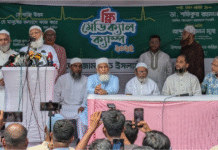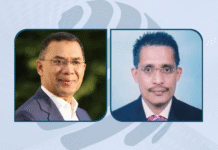International outrage focussed on Bangladesh’s labour violations remains indifferent to a concurrent reality: the increased targeting of women and girls as subjects of political violence.
Four female MPs from the Bangladesh Nationalist Party (BNP) were arrested by police as they tried to enter their party office. Mohammed Asad/Demotix. All rights reserved.
At 3pm in the afternoon on Friday 6 February, three men from Chattra League, the student wing of the ruling Awami League political party, arrived at a house in Dhaka’s Jatrabari district. The men demanded the whereabouts of the household’s father, a local leader of the opposition party, Jamaat-e-Islami. The father was away; only his wife, daughter and elderly mother were home. The men demanded the keys to the family wardrobes seeking to loot valuables, and when denied, proceeded to violently vandalise the house, breaking belongings.
The daughter of the house, 19-year-old Iffatuddoha Sadia, began calling for help. Armed with knives, the intruders pounced on Sadia and her mother Fowzia, stabbing both women repeatedly. They then fled the scene. Neighbours rushed mother and daughter to hospital; Sadia died a few hours later in Islami Bank Hospital after surgeons failed to save her. Fowzia is fighting for her life in intensive care at Dhaka Medical Hospital. Their only crime was being members of an opposition household. With her father forced into hiding and her mother fighting for her life, neither of Sadia’s parents received the closure of attending their daughter’s funeral and seeing their beloved child for the last time.
Years of political unrest in Bangladesh came to a head in early January this year when the opposition coalition, that includes the Bangladesh Nationalist Party (BNP) and the Jamaat-e-Islami (JI) demanded fresh elections under a neutral caretaker government on the first anniversary of the controversial January 2014 elections that renewed the Awami League’s tenure with Prime Minister Sheikh Hasina at the helm. The opposition boycotted the polls,labelled a “farce of an election” by The Economist, after the Awami League abolished the caretaker government system that ensures a neutral body of technocrats oversees fair elections. The caretaker government system has been successfully applied in Bangladesh since the 1990s, ensuring credible polls. The opposition alleged, with justification, that elections conducted by the Awami League would be rigged.
When the right to hold a democratic rally on 5 January was denied, and the opposition leader Khaleda Zia was forced instead into house arrest, the opposition alliance enforced a nationwide transport blockade. The BNP and its allies have also conducted street protests across the country. Terrible petrol bomb attacks on commuter buses have cost dozens of innocent lives, with the government and the opposition blaming each other but no impartial investigations taking place to credibly identify or hold to account those responsible.
While opposition protests have included violence, there have been several cases of ruling party activists caught with petrol bombs. The authorities have conducted sweeping arrests against the opposition, with 17,000 leaders and members arrested in January alone, coupled with a government-endorsed policy of shoot-on-sight that has led to dozens of deaths, raids on homes andschools, extrajudicial executions, and a recent order by the deputy inspector general of Dhaka to his police force to “not just shoot [protesters], [but] kill their whole families”.
The result of that shocking command is that families–including women and children such as Fowzia and Sadia–are no longer safe even in their own homes. The practice of ruling party activists participating with police in the state-sponsored reign of terror only makes this latest injunction more deadly. It is particularly troubling given the sacred place women traditionally have held in Bangladeshi society that rendered them off-limits, despite the country’s murky politics. This has seen a sharp and disturbing change under the Awami League, which returned to power in 2008.
On 17 December 2012, 20 female students of the opposition student body, Chattri Shongstha, were arrested in their Dhaka offices. In Bangladesh the law does not require the police to have warrants for arrest, facilitating huge abuses of power. None of these women had a criminal record, but membership of the opposition was crime enough, and so they were jailed under terrible conditions and burdened with trumped-up charges. To add to their humiliation, the veiled women were forcibly unveiled at court.
The arrests caused a commotion in Bangladesh at the unprecedented actions of police targeting ‘respectable’ women. Women’s Rights Organisation Bangladesh (Nari Odhikar Shongstha Bangladesh) held a press conference on 5 January 2013 demanding the release of the girls, only for over a dozen of the organisers, including some of the most respected members of Bangladesh’s civil society, to be arrested at the press conference itself. On 19 March 2013, a further 16 opposition-affiliated women and girls were apprehended at a gathering organised in Narayanganj to celebrate the recent excellent examination results of the girls, most of whom were minors of Class 9. Neither minority nor merit shielded them from arrest for so-called “suspicion of causing sabotage”. On 28 August 2013, 22 female opposition affiliated students, many also school age minors, were arrested from an Eid gathering in Barisal on vague fabricated charges of “planning lawlessness and anarchy”. Children too are now political targets in Sheikh Hasina’s Bangladesh. If the campaign for women’s rights, which so many around the world take pride in advocating for, is to hold any credibility, it must address violence beyond that which directly affects the western marketplace.
Since these events, arrests have continued to snowball yet remain largely unreported in international media. Even domestic media, which is dominated by the ruling party, has barely reported on the issue. One activist confided under conditions of anonymity that over 300 opposition women from her party were arrested in 2014 alone. On 31 January 2015 18 opposition women, including lawyers, were arrested following their visit to meet former Bangladeshi Prime Minister Khaleda Zia, who had been under extrajudicial house arrest for over a fortnight. On 10 February 2015 another five opposition schoolgirls, aged 15 to 19, were arrested in the town of Noakhali.
Severe custodial torture of male prisoners under this government is well-documented. That the arrests of hundreds of women and girls have gone largely and disturbingly unnoticed suggests that any possible and probable custodial abuse has taken place in silence. A contributing complication is the social politics of shame that renders discussions on violations of the female body a taboo.
The murder of Sadia marks a new and outrageous low. Like the arrests, if this too goes unreported in national and international press, it is likely that such murders will increase. As one resident of Jatrabari stated, also anonymously in the prevailing climate of fear, “it used to be just the men who lived in fear. Now we, too, women and children, are living in terror.” The reality on the ground in Bangladesh is truly disturbing; such crimes not only grossly violate women’s rights in the country, but also further fuel and aggravate instability in a nation increasingly on the brink.
Crucially, given the increasing visibility of women’s rights movements in the world today, it is troubling to see so little attention given to Bangladesh, apart from the (no less relevant) issue of labour rights, where Bangladeshi women are major producers of western fashion. If the campaign for women’s rights, which so many around the world take pride in advocating for, is to hold any credibility, it must address violence beyond that which directly affects the western marketplace. Women’s participation in education and politics are foundational factors of empowerment that must be protected, yet these avenues are actively and violently being curtailed in Bangladesh for those not toeing the line of the ruling party. Even women’s rights activists are not spared.
Sadia was not only a young girl in her prime ripped from the bosom of a loving family. She was an accomplished young lady with incredible promise. A graduate of Tamirul Millat Madrasah, among Bangladesh’s premier seminaries that combine the national curriculum with traditional religious sciences, she went on to attend National Ideal College in Dhaka and had just started a degree in physics at Eden College, one of Bangladesh’s oldest and most reputable universities. Alongside academic merit, Sadia was also socially and politically conscious and active. For any nation seeking female advancement and empowerment, she would have been an asset and role model.
While Bangladesh is hailed for its female premier, it is Sheikh Hasina herself–who gained her position through hereditary politics and a discredited election rather than any feat of female empowerment–who is violently restricting the rights of women and girls in Bangladesh through political vindictiveness. As the violations mount and Bangladesh’s women and children live in evermore terror, these stark realities can no longer be ignored.
Source: Open Security










